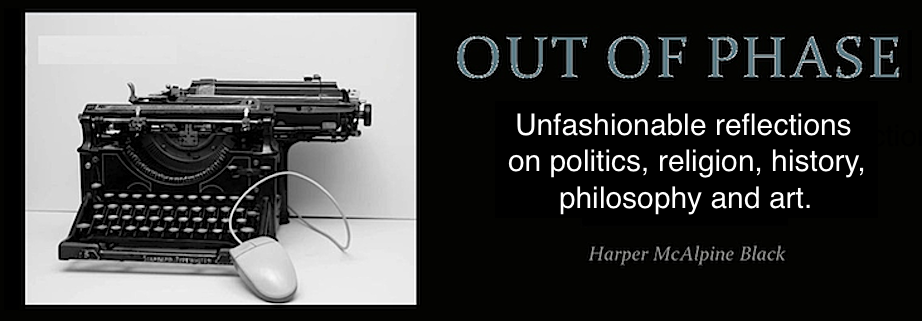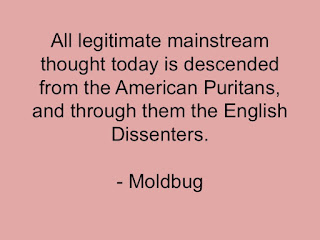It should hardly come as a surprise to readers of this journal, nostalgic as it is, and replete with neocolonialist and anti-modernist sympathies, that the author is an avid reader of that brave breed of contemporary political thinkers who are gathered under the label Neoreactionary, or NRx for short. Chief among them is the character known, pseudanonymously, as Mencius Moldbug, who is perhaps - and it is no exaggeration - the only truly original political thinker of our times. It was the author's privilege to present a talk on the aforesaid thinkers, and Mr. Molbug in particular, at the Bendigo City Public Library as part of their Philosophy in the Library series, on the cold, rainswept evening of October 3rd last. This posting relives the presentation made that evening by way of the slideshow to which the author, as presenter, spoke. The talk, due to last an hour and intended to be introductory and accessible to the general public, went briefly as follows:
1. The presenter explained that he had had chosen to introduce an element of contemporary political philosophy to the series since political philosophy tends to be under-represented. Everyone bangs on about something called "ethics" in philosophy these days. Boring. There is, in fact, a whole 'Dark Enlightenment' of new poltical thought waiting to be discovered.
2. A slide to sooth those made restless by a political topic. Ancient Alexandria and the great lighthouse, an emblem of Neoreaction. This too a means of taking the presentation back to ancient times...
3. The presenter declared his personal affinities and interests. He is, above all, a Platonist and is reading the NRx through the lens of Platonic political thought. Specifically, Plato (especially the Republic) gives a comprehensive critique of democracy, but where in contemporary thought can one find any serious engagement with that critique? The presenter has found kindred spirits in this regard among the Neoreactionaries. But, he wonders, are they just rehashing the arguments of Thrasymachus and co.? Do they go beyond the assertion that 'might makes right'? The presenter supposes that this is the central problem in Western political philosophy. Where do the NRx stand?
4. A key slide that announces many themes. The quotable Mr. Nicholas Land points out that the evils of democracy were thoroughly understood in European classical antiquity and yet today it amounts to an unquestioned religious dogma. How did we get to this impasse? The presenter admits that he is especially interested in the notion that democracy is now a religious creed since religions - including secular ones - are among his areas of concern, both professionally and privately. Where philosophy veers off into religion is exactly his territory.
5. Introducing the Neoreactionaries. They, like the present author, are bloggers.
6. The main blog in question is - or was, since it is no longer a going concern - Mr. Molbug's 'Unqualified Reservations'. Recommended browsing.
7. It all began with an unassuming blog post in 2007. Moldbug was fooling around in his garage one day and decided to invent a new political philosophy...
8. The title 'Formalism' then required a little explanation. Mr. Moldbug took it from legal philosophy where the Formalists are mortal enemies of the Realists. The Realists (judicial activists) have been running amock in the US legal system since at least the 1960s.
9. Moldbug has a keen interest in law and legal philosophy. (The point was made here that Plato encountered similar legal decay in Athens which, like the USA, became notoriously litigious.)
10. A Molbugean principle. Limiting government is an invitation to an unlimited judiciary. Power, by its nature, is absolute. If you limit it in one area, another area will fill the void.
11. So who is this character? No, Mencius Moldbug is not, in fact, his real name. Like many bloggers - including the present one - he writes under a playful pseudonymn. Real name: Curtis Yarvin. Computer geek. (Helpful voices in the audience pointed out here that once upon a time computer geeks were hairy leftists in sneakers. Moldbug is that new generation of anarcho-capitalist geeks firmly on the Right of the political spectrum. The social capital in Silicon Valley has moved.)
12. Some intellectual biography. Moldbug began reading Ludwig von Mises, guru of the libertarian Austrian school of economics. But he ended up reading...
13. Thomas Caryle. This caused the presenter to digress with a brief life of Carlyle since these days virtually no one reads Carlyle or has even heard of him. Carlyle Revisited. The story was told of Mr. Carlyle's famous history of that great watershed the French Revolution...
14. And how John Stuart Mill's housemaid burned the only copy in a famous mishap.
15. So famous, in fact, that here the incident is shown in a contemporary Japanese illustration. Stoic and Scottish, though, Carlyle sat down and wrote it again.
16. This deserved a few juicy quotes from the Scottish sage, such as this one. The Carlylean prose style in action.
17. And this one.
* * *
* * *
18. Cut to Edmund Burke who also gave us an account of the French Revolution. The point here was that Moldbug and the Neoreactionaries are not Burkeans. In fact, they're not a lot of things. Let us list a few...
19. They are not Neocons. That's for sure.
20. And nor are they Cuckservatives - those miserable political cuckolds of the contemporary Right who are happy to have Whigs screw their wives and daughters and take whatever they want as long as they - the Cucks - can have the money. The bogus Right.
21. And they are not patriots either. There is a big assortment of odd characters on the political Right. In Leftist fantasies they are all the same (because Leftists are all the same, since Leftism by definition is collectivist.) The Right is characterised by great diversity.
22. There are the libertarians. Moldbug started out as a libertarian but, as we will see, grew out of it.
23. There are also the so-called 'National Conservatives' of various sorts. Big in Japan. Big in most places, in fact. But NRx is not that either.
24. And they are not neo-Nazis, no matter what their critics might say. From the NRx viewpoint Nazism was, well, National Socialism, and in that a socialism like any other.
25. At this point the presenter considered it wise to remind the audience of Godwin's Law. Whigs live in strange little bubbles. If they ever encounter an idea from outside that bubble their first instinct is to cry, "Nazi!" and to consider the argument done. But no, NRx is not Nazism either and has little or nothing in common with Nazism.
26. Is it, then, Traditionalism? That, the presenter explained, is perhaps nearer the mark, although not quite. Some NRxers like reading Julius Evolva, it is true. Yet the NRx are against "universalism" - something to which many 'Traditionalists' are prone.
27. Then is it, someone asked, Alt Right? Well, yes, more or less. Alt Right being a broad designation for a wide range of ideas on the political Right that are NOT Burkean, Neocon, Cuckservative or any of the others. The Alt Right is otherwise known as the Real Right - as opposed to the compliant gutless mainstream New World Order Right that has been a total disaster in conservative politics over the last two generations or so. It is not inaccurate to characterise the Neoreactionaries as Alt Right, of a sort.
28. By now, after twenty-seven slides, the audience was visibly restless. What exactly is a Neoreactionary anyway? they wwere eager to know.
29. The presenter showed them the lighthouse at Alexandria again.
30. And then a map of the so-called 'Dark Enlightenment'. This confused everyone but it did at least get across the idea that Neoreaction is diverse. (Hot topics such as Human Biological Diversity were avoided during this exposition.)
31. So, a quote from Mencius again. What does he want? Government that is (a) extremely small, (b) extremely efficient and (c) extremely strong. As distinct from what libertarians typically want. Remember - he started life as a libertarian but turned into a Neoreactionary when he grew up and read Carlyle.
32. A further account of what Neoreactionaries want. A future among the stars.
33. Some examples. The XVIIIth C. tradition of enlightened absolutism of Frederick the Great and such XXth C. examples as Singapore, Hong Kong, Dubai. The return of the City State.
34. Supplemented by a nice quote from Nick Land.
35. And then the presenter drew attention to the last part of the Nick Land quotation. What is Neoreaction? What do they propose? What sort of world do they envisage? Mr. Land spells it out here.
* * *
36. The presenter then provided a quick display of cat memes to underline key NRx themes. Every Philosophy in the Library lecture, he believes, requires a cat meme interlude. (For some in the audience, this was the highlight of the whole evening.)
37.
38.
39.
40.
41. For more information, the presenter directed attendees to the Hestia Society, NRx front group. (There was some discussion of the motto 'The only morality is civilization'. Hobbsean, what?)
* * *
42. Turning now to a few salient NRx themes. First, Moldbug's notion of the 'Cathedral' = The Whig Establishment.
43. A quote from Land to further the point.
44. And - to the delight of some in the audience, and the shock of others - a few slides illustrating Mencius Moldbug's deep hostility to universities and academics. (It became clear that this is a matter near to the presenter's heart. Moldbug, in his opinion - having spent a quarter of a century in academia - is on the money here.)
45.
46.
47.
48.
49.
50.
* * *
* * *

51. By now the lecture is obviously running over time, so it is necessary to truncate the final section. The presenter offered several key themes of classical Moldbuggery. The first, and least contentious perhaps, is that social and political decay has been masked by technological change. NRx is a geek philosophy by geeks for geeks, and geeks should know. As the social fabric frays around us we stare at our iPhones and give it no regard. Waves of technological advancement mask political decline. This must be even more obvious in hi-tech Europe.
52. Secondly, a key theme in Moldbug is the Puritan genealogy of Leftism. The presenter observed here - by the way - that is very different to the old Right where it was the Jews who were the bad guys. There is no anti-semitism in Moldbug - indeed, he's Jewish! On his reading of history (very astute and intelligent) the Whigs go back to Calvin. The presenter is enthused by this idea and again thinks that Moldbug is on the money. Leftists are Puritans. Leftism is a puritan religious cult.
53.
54.

59. And finally, a point of political philosophy certainly worth discussing. What is worse, weak or strong government? We remember that Plato's guardians are given absolute power. But doesn't absolute power corrupt absolutely? A potent theme in Moldbugean thought is that, on the contrary, it is weak governments that commit heinous acts. When a government feels threatened they round up their enemies and put them in concentration camps. Or they fail to act when action is needed, such as weak democratic governments that lack the fortitude to address debt. Plato was right about this too. Democracy floats in a sea of debt because no one will vote for necessary austerities. It thus becomes a orelude for tyranny. Better to have strong government that can act when action is warranted. This, again, is where NRx parts company with libertarians.
60.

62.
* * *
The presenter went a full twenty minutes over time and hardly scratched the surface. There was, however, some lively discussion afterwards and the next day in another venue.




























































